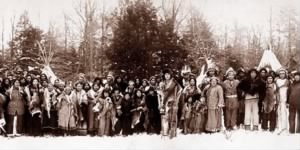Check out the titles in this collection. They include:
- Ratified Indian Treaties (1722-1869): Ratified treaties that occurred between the United States government and American Indian tribes. Also included are presidential proclamations, correspondence, and treaty negotiation expenses.
- Indian Census Rolls (1885-1940): Census rolls submitted annually by agents or superintendents of Indian reservations as required by an 1884 Act of Congress. Only persons who maintained a formal affiliation with a tribe under Federal supervision are listed on these census rolls.
- Dawes Packets: Applications between 1896 and 1914 from members of the Cherokee, Creek, Choctaw, Chickasaw, and Seminole tribes to establish eligibility for an allotment of land in return for abolishing their tribal governments and recognizing Federal law.
- Dawes Enrollment Cards (1898-1914): Enrollment cards, also referred to as "census cards," prepared by the staff of the Commission to the Five Civilized Tribes, commonly known as the Dawes Commission. The cards record information provided by applications submitted by members of the same family group or household and include notations of the actions taken.
- Eastern Cherokee Applications (1906-1909): Applications submitted for shares of the money that was appropriated for the Eastern Cherokee Indians by Congress on June 30, 1906.
- Enrollment of Eastern Cherokee by Guion Miller (1908-1910): The Guion Miller Roll is perhaps the most important source for Cherokee genealogical research. There are an estimated 90,000 individual applicants from throughout North America included within this publication.
- Cherokee Indian Agency, TN (1801-1835): The records of the agent of Indian Affairs in Tennessee, including correspondence, agency letter books, fiscal records, records of the Agent for the Department of War in Tennessee, records of the Agent for Cherokee Removal, and miscellaneous records.
- Rinehart Photos - Native Americans (1898): Photographs of over 100 Native Americans taken by Frank A. Rinehart, a commercial photographer in Omaha, Nebraska. Rinehart was commissioned to photograph the 1898 Indian Congress, part of the Trans-Mississippi International Exposition.

Native American Collection:
'via Blog this'
No comments:
Post a Comment